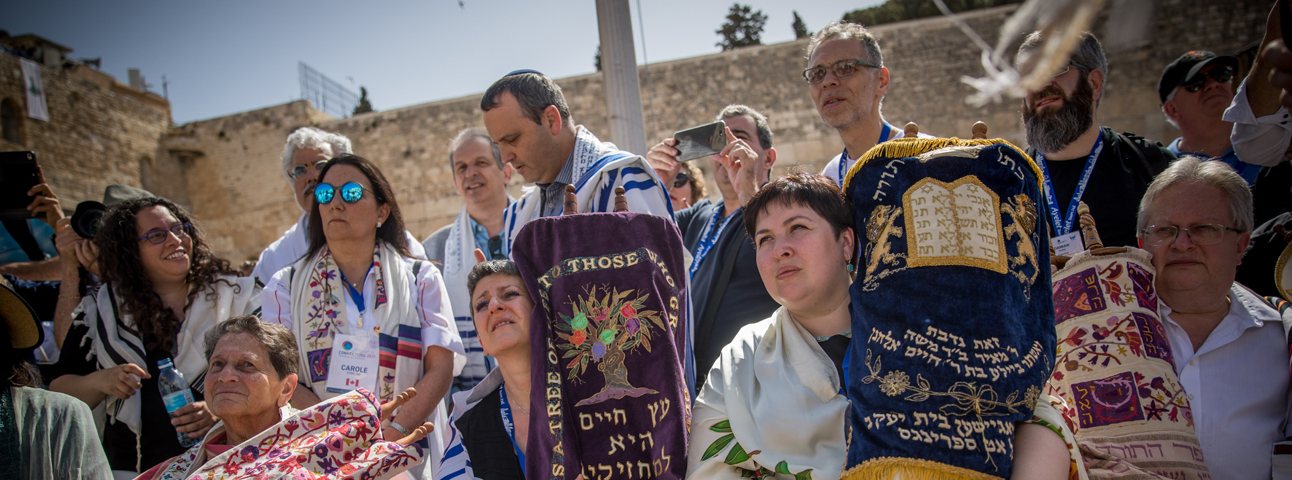Strengthening Jewish Peoplehood In The Diaspora — But Not In Israel
In the bill’s final wording, the state only commits itself to act within the Diaspora to strengthen the ties of Jewish peoplehood – as if actions taken inside the Jewish state, like the reneged-upon Western Wall compromise, have no bearing on the rest of the Jewish world.

Illustration | Flash 90
Since its passage in the Knesset on July 19th, Israel’s Nation-State Basic Law has managed to stir up anger and debate not just inside Israel but around the world. In a recent appearance on the BBC, the interviewer prefaced her question to me by insinuating that the idea of constitutionally defining Israel as a Jewish state was somehow controversial.
This was one of the biggest fears for people, like me, who opposed the bill: that instead of bolstering Israel’s legitimacy as a Jewish state it would shake it, and that many would start to question the treasured idea of Israel as simultaneously the Jewish national home and a vibrant liberal democracy.
It was the genius of Israel’s founding fathers, especially David Ben-Gurion, to articulate precisely how the Jewish state would balance between the particular and universal aspects of its identity—a dilemma common to all democratic nation-states. The Declaration of Independence they crafted in 1948, in the midst of a bloody war for survival, provides a clear moral answer that still rings true seventy years later. Beginning with the historic connection of the Jewish People to the Land of Israel, and affirming the Jewish right to national self-determination in that land, the Declaration went on to pledge that the new, Jewish state would guarantee the equal civil, human, and political rights of “all its inhabitants, irrespective of religion, race, or sex.”
That last part is essential. And herein lies the main problem with the new Nation-State law: it eschews any mention of equality, and does not even offer a passing allusion to the Declaration of Independence and to the principles it contains. Indeed, as a quasi-constitutional Basic Law, it quite possibly undermines Israel’s founding document.
You might expect that a matter of such weighty nature would benefit from a serious public debate and broad consensus. You would be wrong. Despite being in the works for years, most of the negotiations took place among coalition members and behind closed Knesset doors. As a result, the bill landed on the Israeli public agenda with a thud. And the impact was immediate. For the first time, many in Israel – not only the significant Arab-Israeli minority but also the Druze community (whose members serve proudly in the IDF), gay rights activists (who were energized further by a subsequent bill denying same-sex couples the same surrogacy rights as heterosexual couples) and mainstream Israelis from all sectors– woke up to the realization that their equality is not constitutionally guaranteed in the State of Israel.
The public outcry, and a growing protest movement, are indications that democracy and equality are just as important to Israelis as the Jewish character of their state. A recent poll by the Israel Democracy Institute, which I head, bears this out: despite the propaganda that this is somehow a matter of left vs. right, of those in favor of the Jewish state vs. those who oppose it, fully 60 percent of the public wants the law amended so as to include a clause guaranteeing equality.
Jews in the Diaspora should take note: this isn’t just an issue of minority rights inside Israel. Reportedly, the law passed as part of a political deal between Prime Minister Benjamin Netanyahu and the ultra-Orthodox parties in his coalition, who succeeded in watering down the clause dealing with Israel’s connection to the rest of the Jewish people. In the bill’s final wording, the state only commits itself to act within the Diaspora to strengthen the ties of Jewish peoplehood – as if actions taken inside the Jewish state, like the reneged-upon Western Wall compromise, have no bearing on the rest of the Jewish world. The end result is that a law meant to reaffirm the unity of the Jewish people around the idea of a Jewish national home does exactly the opposite.
As a symbol, the Nation-State Law sends a negative message. But it’s important to keep in mind that nothing, in practical terms, will change overnight. The law is ambiguously formulated, and a lot will depend on how future Supreme Courts interpret its meaning. In the meantime, Israelis and Jews everywhere should join the fight for its amendment. Once this happens, my BBC interviewer, and those of similar mindset, will have one less reason to question Israel’s enduring commitment to the Zionist vision of a proud Jewish state that is unabashedly democratic. They might even pause to admire the courage of a young nation-state grappling with the inevitable tensions contained within that vision—and realize Israel is not so different from other democratic nation-states after all.
The article was first published in the Forward.

Illustration | Flash 90
- Tags:
- Nation-State,
- Basic Law: Nation State,
- nation state of the Jewish people,
- Israeli political system,
- Diaspora,
- Israeli society,
- Arab citizens of Israel,
- Arab-Jewish relations,
- equality,
- Judaism and democracy,
- judicial issues,
- Democratic Values and Institutions Program,
- Center for Democratic Values and Institutions,
- The Joan and Irwin Jacobs Center for Shared Society
